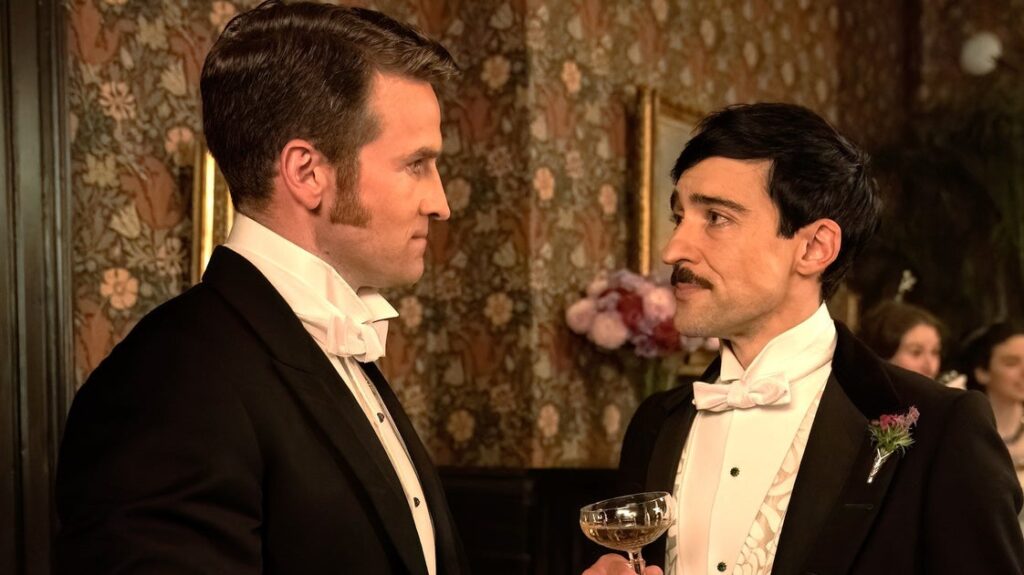Claybourne Elder had a wealth of personal experience to draw from when he landed on the role of John Adams, the fictional grandson of former President John Quincy Adams, who is portrayed as a gay man in New York’s 19th-century elite on HBO’s “The Gilded Age.”
“Growing up in Utah as a Mormon, there was a lot about hiding who I was, hiding how I really felt,” the actor, who is gay, told HuffPost. “One thing I loved about John is … he wasn’t interested in hiding who he was. He wanted to find a way to live his life within the construct of the system.”
“The Gilded Age” is written and created by Julian Fellowes, the mastermind behind “Downton Abbey.” The series, which concludes its third season Sunday, offers a titillatingly fictionalized take on the “Boom Years” of New York City in the 1880s.
John appeared in the period drama’s premiere season as a prospective love interest for Marian Brook (played by Louisa Jacobson), who has escaped poverty by moving in with her wealthy aunts Agnes van Rhijn (Christine Baranski) and Ada Forte (Cynthia Nixon).
In a twist, John secretly begins an affair with Agnes’ son, Oscar van Rhijn (Blake Ritson), who intends to keep his sexuality hidden by marrying a woman.
By Season 3, John and Oscar’s romance has cooled. Still, viewers were shocked to see John fatally struck by a horse-drawn apple cart on the July 27 episode, “If You Want to Cook an Omelette.”
Last week’s episode, “Ex-Communicated,” found Oscar learning he’s inherited some of John’s fortune while going to lengths to avoid revealing specifics of their relationship at the funeral.
“It’s funny getting killed off on a TV show, because everyone treats you like you have a terminal illness,” Elder said. “It’s also like attending your own funeral, because you hear from so many people about what your story meant to them.”

When it came to shooting John’s death, Elder jumped at the chance to do his own stunts, even if it required being strapped into a harness and knocked down repeatedly by studio equipment ― an experience he documented for posterity on Instagram.
“At first, I was like, ‘I can do this.’ But after being in the harness for four hours, I couldn’t feel my legs anymore,” he said. “Finally, I was like, ‘OK, I’m ready to be dead.’ But if you’re going to go [as a character on a TV series], I’d rather go out with a bang.”
John’s death comes just as “The Gilded Age” is enjoying a surge in viewership, and the series was renewed for a fourth season last month. Though Elder isn’t sure if John will reappear in flashback sequences or otherwise, he jokes that his character “is going to haunt the shit out of Oscar.”
“I don’t know if it’s going to be on camera or spiritually,” he said, “but John’s going to be there, watching him.”

As for Ritson as a scene partner, he added, “The thing I’ll miss most is going to work with Blake every day. We’ve become such good friends and love each other very much. It was a delightful experience, and he made it very easy.”
Like other members of “The Gilded Age” cast, Elder first rose to prominence in theater, appearing alongside Jake Gyllenhaal in the Broadway revival of “Sunday in the Park with George” in 2017 and, most recently, the Tony-winning revival of “Company” in 2021.
With his time on “The Gilded Age” at an end ― at least for now ― Elder is set to return to the stage with his touring concert, “If the Stars Were Mine.” He recently recorded songs from the show as a solo album, set for release later this year.

He’s also looking forward to some down time with his husband, playwright and theater director Eric Rosen, and their 8-year-old son, Claybourne “Bo” Philip Rosen-Elder, while pursuing new projects that reflect other aspects of the LGBTQ+ experience.
“It’s great to be a gay character on an HBO show, to have that visibility and that viewership,” he said. “It’s also important to tell a story that’s important to 30 people, if it’s going to change and affect somebody. There are lots of us trying to be the paint on somebody else’s canvas, when it’s much harder to make the painting.”
“As a kid, I didn’t know that there were gay parents. I didn’t know that was possible until I was well into my 20s,” he continued. “So I want kids from a country town like mine to see [my work] and say, ‘Oh, that’s possible. I can have a family. I don’t have to ― by coming out as a gay person ― give up on all of these things I want.’ For me, that’s important.”


